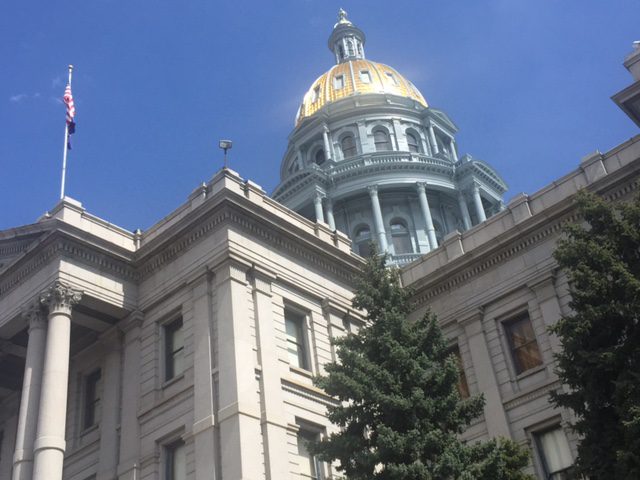A summary of the list of recommendations on the implementation of the OBBBA in Colorado regarding public benefits systems and work requirements.
Recent articles
CCLP testifies in support of Colorado’s AI Sunshine Act
Charles Brennan provided testimony in support of Senate Bill 25B-004, Increase Transparency for Algorithmic Systems, during the 2025 Special Session. CCLP is in support of SB25B-004.
Coloradans launch 2026 ballot push for graduated state income tax
New ballot measure proposals would cut taxes for 98 percent of Coloradans, raise revenue to address budget crisis.
CCLP statement on the executive order and Colorado’s endless budget catastrophe
Coloradans deserve better than the artificial budget crisis that led to today's crippling cuts by Governor Jared Polis.
Legislative Update: April 5, 2019

Bills to Watch: HB 1257 and 1258
As CCLP’s Executive Director and former state Rep. Claire Levy pointed out while testifying in front of the House Finance Committee on Monday, the Taxpayer’s Bill of Rights (or TABOR) wasn’t designed to adjust the state’s budget according to the needs of the people of Colorado. It was devised “for the expressed purpose to strangle government to the point of ineffectiveness.”
Thanks to creative and wise leadership among legislators, state government hasn’t yet imploded since voters approved TABOR in 1992, but legislators are running out of options to get by. Meanwhile, the state’s infrastructure, roads and educational institutions are in tatters 27 years after TABOR’s approval.
During her testimony, Levy noted that the state has been forced to confront significant problems in mental health, child welfare, criminal justice, education, and natural disasters, with what Levy characterized as “insufficient half-measures, inadequate pilot programs, ineffective work-arounds, and hopeful, but hopeless, reliance on ‘gifts, grants and donations.’”
Sponsored by House Speaker KC Becker, Rep. Julie McCluskie, and Sens. Lois Court and Kevin Priola, House Bills 1257 and 1258 would let voters decide in November if excess revenues above the TABOR limit could be used to provide funding for public schools, higher education and roads, bridges and transit, rather than refunding the money to taxpayers in years when the economy is doing well. It’s well-known that TABOR’s restraints effectively prevent Colorado from keeping up with its population growth.
CCLP joins its partners in the advocacy community, business interests and community organizations in supporting these important bills. While the simple act of lifting the TABOR revenue and spending cap will not entirely restore Colorado government to how a properly functioning representative government should operate, it’s a good start.
On the Radar
Speaking of Colorado’s fiscal restraints, now that state legislators have a budget to work with, they can begin the process of prioritizing many bills piling up in the House and Senate Appropriations Committees.
This year, lawmakers have allocated $40 million between both chambers for bills that require new spending. Legislative caucuses will convene over the weekend to help lawmakers determine what legislation with fiscal notes should be funded.
Among the CCLP-supported bills waiting for funding appropriations are:
House Bill 1223, which would create a program to help Coloradans apply for Supplemental Security Income (SSI) and Social Security Disability Insurance (SSDI) — two federal programs that help people with disabilities meet their needs by providing them with monthly income support. CCLP estimates that Colorado could realize a $6.2 million return from a $3.6 million investment in application assistance by reducing spending on state assistance. Learn more about the legislation in this blog by CCLP’s Allison Neswood.
Developed by CCLP and Colorado Coalition for the Homeless, Senate Bill 180 would appropriate funds to provide legal assistance for Coloradans facing eviction and help them to avoid the financial devastation from a forced move.
Another CCLP-led measure, HB 1013, would extend Colorado’s child care tax credit for households earning less than $25,000 beyond 2020, when the credit is due to expire. The tax credit is essential in defraying the cost of child care, which is consistently one of the highest-ticket basic needs for working families.
Developed by the Colorado Skills to Compete Coalition, HB 1107 would establish a three-year pilot program that would provide funds to community-based organizations that work with people who are trying to get into the workforce or improve their skills to get a better-paying job. These organizations would be able to help people with unexpected expenses (such as babysitting for a sick kid or car repairs) that could derail their job training or employment prospects.
Additionally, The Property Tax/Rent/Heat Credit Rebate (commonly known as the PTC Rebate) is also in House Appropriations. Sponsored by Rep. Tony Exum and Sen. Rachel Zenzinger, House Bill 1085 would modestly increase eligibility, and the amounts and income thresholds for the PTC rebate, while indexing the rebates to inflation in the future.
Finally, CCLP supports HB 1239, which would create a grant program within the Colorado Department of Local Affairs, which would be awarded to local governments and nonprofits throughout the state to increase outreach efforts for the U.S. Census – ensuring that every Coloradan counts and that the state receives adequate federal funding.
As legislators prepare to take action, we encourage you to contact your state representatives and urge them to support these bills that invest in the health and well-being of Coloradans.
